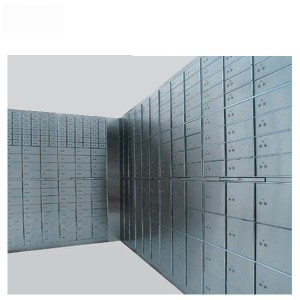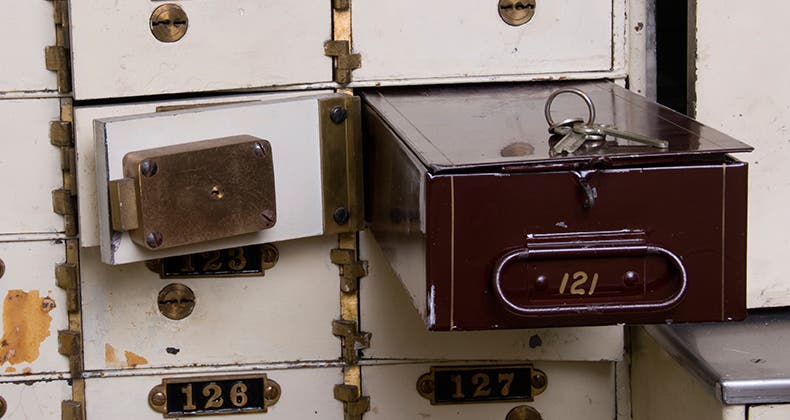Renting a safety deposit box can be an effective, and affordable, way to store and protect important documents, family heirlooms, and priceless valuables. The convenience alone makes it an attractive alternative to a home or office safe, and with your possessions being stored along side of the bank's own assets you can be sure they will be properly protected.
Each safety deposit box has two key slots, one for a bank manager and the other for the owner. This means that both people have to be present to open the box. Once opened, a smaller box within remains to be opened by the owner in privacy. These smaller more thin metal boxes contain the items. As digital records and cloud storage become the norm, the stodgy safe deposit box is under threat to join our growing list of things that will soon disappear forever. But don’t rush to declare the. Jun 01, 2020 As digital records and cloud storage become the norm, the stodgy safe deposit box is under threat to join our growing list of things that will soon disappear forever. But don’t rush to declare the. Safe deposit boxes provide a secure place other than your home or office to store valuables. If you decide to rent a safe deposit box, consider what size you’ll need, who else will have access, and appropriate items to keep in the box. How to use your safe deposit box Access your box regularly and keep a list of what it contains.
Of course, there's more to renting a safety deposit box than simply paying the annual fee and slipping the keys on your keyring. You have to consider what you will be storing in the box, who will have access to the contents, and what your responsibilities are as a box holder. You also have to understand where the bank's liability begins and ends, and what steps you need to take to keep your valuables truly secure.
The Benefits of Safe Deposit Boxes
Safe Deposit Box Wells Fargo
A safety deposit box offers privacy and security at a price that most of us can afford. While it's always tempting to want to keep valuables and important documents close to hand, simply locking them away in a cabinet or desk isn't a sensible option. It not only leaves them vulnerable to theft, it also increases the risk of loss by fire, flood, or simple carelessness. Combination safes and lock-boxes are a somewhat better option, but even they fail to deliver the privacy and protection of a safety deposit box stored in the vault of your local bank. The key benefit of a safe deposit box is that you get to take advantage of your bank's state of the art security systems – all for a nominal annual fee starting as low as $20 or $30.
Is Your Home Safe Actually Safe?
If you have a small safe at home you not only have to worry about natural disasters, but if it is easy to carry the safe out of your house, a burglar can easily break it open elsewhere. A safe at home acts as an advertisement for what to steal to any burglar who sees it, which is why some people opt to conceal items in a fake book or diversion can rather than secure valuables in an easy to find safe. None of these solutions give you the peace of mind a safety deposit box at a bank does.
What Should You Put Into Your Safety Deposit Box
As a general rule of thumb, a safety deposit box should be used to store any personal possessions that you simply can't afford to lose. That could mean anything from your marriage license to your grandmother's antique brooch. When deciding what to put into a safe deposit box, it's important to remember that it's not just about protecting those items from theft. You should also consider what could be lost through negligence or natural disaster. For example, if you have stock certificates stored in a lock-box in the den they could easily be lost in a fire or flood, and that could mean a substantial financial setback for you and your family.
The most common items people store in their safety deposit boxes include:
- Family Documents (birth certificates, marriage licenses, passports)
- Property Deeds and Titles
- Mortgage Documents
- Insurance Policies and an Inventory of Personal Possessions
- Personal and Business Contracts
- Financial Documents (stocks, bonds, certificates of deposit)
- Miscellaneous Valuables (jewelry, antiques, collectibles, family heirlooms)
What NOT to Put Into Your Safe Deposit Box
Safe Deposit Box Security
While nearly anything of value can be stored in a safety deposit box, there are some things that probably shouldn't go in. Chief among these are any important legal documents that you, or your family, might need to access in an emergency. For example, a will or power of attorney should be left in the care of your lawyer. In the event of an accident, or sudden death, your dependents will need to retrieve these documents in a timely manner, and that may not be possible if they are locked away in a bank vault. Particularly if you are the only key holder.
Not So Safe: A Warning Against Storing Forbidden Items
There are also some things that can not legally be stored in a safety deposit box. For instance, drugs (both legal and illicit), firearms, and explosives are all prohibited items. While it's true that privacy is a primary advantage of renting a safe deposit box, and banks make a point of not knowing what their customers have stored on their premises, it's never a good idea to break the law.
If law enforcement suspects that you are storing prohibited items, or are hiding the proceeds of a crime, they can obtain a warrant to search your safety deposit box and seize the contents.
Finally, some people consider keeping cash in their safe deposit boxes, reasoning that if the bank fails they will still have access to some ready money. This is never a good idea. In the first place, you will be losing out on any interest you could earn if the money was properly deposited with the bank. Second, it suggests that you are trying to hide money from the IRS, and that can lead to serious legal problems down the line. While it's true that keeping cash in a safe deposit box is not illegal, many banks have adopted policies that forbid the practice outright.
Accessing Your Valuable Possessions
When renting a safety deposit box, one of the most important questions is who will have access to the contents. It is not enough to simply give someone you trust a copy of the key. The only people who can be granted access to your safe deposit box are co-renters and duly appointed ‘deputies' or ‘agents' whose identities and signatures are on file with the bank. It's worth noting here that a power of attorney does not grant anyone access to a safety deposit box. The bank has no way to validate the power of attorney or to determine if it is still in force. Consequently, an executor or legal conservator would have to apply to the courts to have the contents of a safety deposit box released by judicial order.

Abandoned Boxes and Unclaimed Property

Should you fail to maintain the rent on your safety deposit box it can be classified as abandoned, with the contents being sold off by the state at auction. Each bank has its own rules regarding abandoned boxes, and the time limits will vary according to the whims of the institution and the laws of the state. Generally, abandoned safety deposit boxes are held unopened for 2 to 3 years, during which time the bank is required to take any necessary steps to contact the renter or their representatives. Failing that, the box will be opened and the contents given over to the state's division of unclaimed property. If this happens, you may still be able to reclaim your property, or that of a deceased family member, by contacting the state's treasurer or through the National Association of Unclaimed Property Administrators.
Safe Deposit Box Sizes
Securing Your Valuables
While safety deposit boxes do provide an impressive level of safety, the bank vaults that house them can be subject to natural disasters. To further protect yourself and your belongings, there are some simple steps you should take. Documents should be kept in plastic bags or envelopes to protect them from water damage in the even of a flood or fire. Valuables like jewelry and collectibles should also be stored in air tight plastic containers. It is also a good idea to label the contents of your safety deposit box, putting your name and account number on each piece to make it easier to identify and reclaim in the event of a major disaster. You should also keep a detailed inventory of all the items you currently have stored in your box.
Insuring Your Belongings
There is a misconception that anything stored in a safety deposit box is insured by the bank or the FDIC. This can be a costly mistake to make. To be sure, banks are responsible for the protection of their vault and its contents, but unless you can prove negligence on their part you will have no claim to reimbursement for any losses due to theft or natural disaster. Some banks do offer insurance to box holders as an added service, and this is an option that should be considered. That being said, most homeowners and tenant's insurance policies have limited provisions covering valuables stored in safety deposit boxes. Depending on the policy, that may be enough to cover your needs. Still, it is often a wise choice to take out additional insurance on any valuables stored in a safety deposit box. In the unlikely event your box is robbed or damaged the extra insurance will help to minimize any potential loss.
Safe Deposit Box Malaysia
What to Expect if Your Bank Fails
No one likes to think about it, but banks do fail on occasion. It doesn't happen often, but if it does you need to know how it effects your safety deposit box and its contents. When an insured bank fails, the Federal Deposit Insurance Corporation (FDIC) steps in and arranges for another financial institution to take over. When this happens customers should be able to conduct business as usual, and the includes having free access to the contents of a safe deposit box. In extreme circumstances, when the FDIC can't find another bank to take over, they will arrange for customers to collect the contents of their safety deposit boxes within the first few days following the banks closure. The contents of any abandoned boxes will be classified as unclaimed property and will be handed over to the state's treasurer.
Safety deposit boxes offer an affordable, and in many cases more effective, alternative to a home safe. They not only help to protect your most important documents, but they also help to guarantee that valuables and treasured family heirlooms are kept safe for years to come. It's the kind of security and peace of mind that money can actually buy.
Homeowners May Want to Refinance While Rates Are Low
US 10-year Treasury rates have recently fallen to all-time record lows due to the spread of coronavirus driving a risk off sentiment, with other financial rates falling in tandem. Homeowners who buy or refinance at today's low rates may benefit from recent rate volatility.
Are you paying too much for your mortgage?
Find Out What You Qualify For
Check your refinance options with a trusted lender.
Answer a few questions below and connect with a lender who can help you refinance and save today!
|